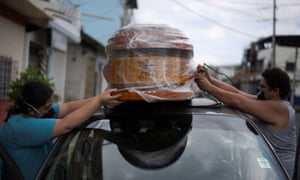
Dead bodies kept in homes or dumped on roadsides as authorities and hospitals are overwhelmed by Covid-19 in Andean nation’s second city.
Democratic leaders given poll boost for handling of crisis
by Tom Phillips and Blanca Moncada in Guayaquil
by Tom Phillips and Blanca Moncada in Guayaquil
It has been three days since Reynaldo Barrezueta passed away at his
home in Ecuador’s biggest city – and still his body lies in a coffin on
the sitting room floor.
“The authorities are just leaving us to die,” said his son, Eduardo Javier Barrezueta Chávez, who has spent the last 72 hours pleading with authorities remove his father’s corpse – so far to no avail.
Barrezueta is not alone. In recent days the coronavirus has swept
into Guayaquil with deadly force, overwhelming local authorities,
funeral homes and hospitals and leaving families such as his facing
unthinkable horrors.“The authorities are just leaving us to die,” said his son, Eduardo Javier Barrezueta Chávez, who has spent the last 72 hours pleading with authorities remove his father’s corpse – so far to no avail.
Photographs and video footage emerging from this crisis-stricken coastal city look like images from the aftermath of a natural disaster: bodies wrapped in sheets and dumped on the roadside or outside houses; desperate families begging for help after being forced to keep their loved-ones corpses at home for days in temperatures of more than 30C.
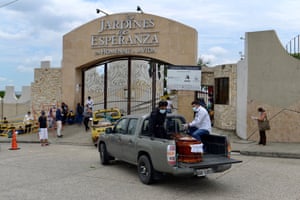
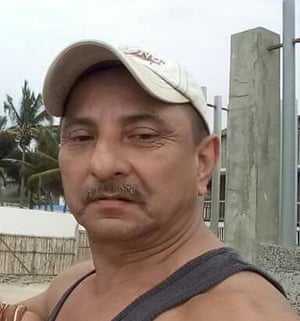
Barrezueta, a 33-year-old odd-job man from the city’s south, has had a front row seat to the dystopia, which many fear offers a terrible glimpse of the future for other Latin American cities as coronavirus accelerates its march across the region.
His 57-year-old father fell ill on 18 March, a week after Ecuador’s president, Lenín Moreno, declared a nationwide coronavirus emergency and nearly three weeks after the country’s first confirmed case.
For five days Reynaldo Barrezueta suffered body and headaches before appearing to improve. But last Thursday Barrezueta said his father deteriorated, developing a ferocious cough, and was taken to Guayaquil’s Monte Sinaí hospital where a chest x-ray suggested he was suffering from pneumonia caused by Covid-19.
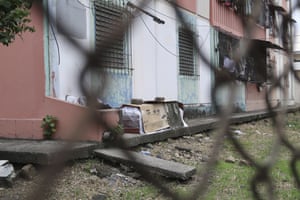
On Thursday lunchtime, more than three days later, his body was still there – a black binbag draped over the coffin in a futile attempt to conceal the growing stench of decomposition.
In a desperate bid to attract the attention of authorities, the victim’s son posted a video on social media in which he kneels down beside the casket, wearing a yellow face mask, and begs: “Please, I’m on my knees asking you to come and help me”.
But so far – with the city’s morgue reportedly full and corpse collectors overwhelmed by the sheer number of dead – no one has.
Fernando Jiménez, the owner of one local funeral parlour, said he had closed his business because it was impossible to secure burial slots at the cemetery. “There was so much emergency demand that we couldn’t cope,” he said. “The situation is really out of control.”
A report in one local newspaper, Expreso, suggested the tragedy was only just beginning. “The situation is going to get even worse,” it predicted on Thursday as Ecuador’s government said it expected Guayaquil would suffer up to 3,500 deaths in the coming months.
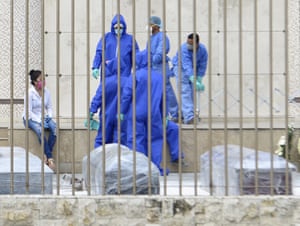
Experts say one explanation is the high levels of air traffic between Ecuador and Spain, which is home to more than 400,000 Ecuadorian migrants and which has the world’s second-highest death toll from the disease. The first Covid-19 case recorded in the South American country was of a 71-year-old woman who flew into Guayaquil from Madrid in mid-February and died there on 13 March.
Others suspect Ecuador’s failure to quickly impose and enforce effective quarantine measures may have played a role, although the government rejects that charge.
The port city’s plight has sent shockwaves across a region where many already fragile health systems are now bracing for a similar wave of patients and deaths.
“It’s not time to snooze. It’s time to get ready,” El Salvador’s president, Nayib Bukele, tweeted this week, pointing to Guayaquil’s calamity as proof.
“They said the pandemic wouldn’t be so bad in Latin America because we’re used to illness, because it’s hot, because our population’s young,” added Bukele, who has ordered some of the region’s fastest and strictest anti-Covid measures. “But just look at what is happening in Ecuador.”
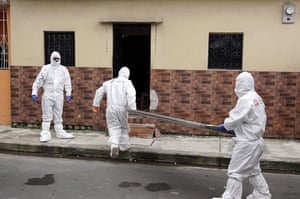
For Barrezueta and his 30-year-old wife, Katiuska Castro, it is an ordeal that is still playing out. As they sat at home with his Reynaldo’s cadaver on Thursday, the father-of-two said grief would have to wait.
“Of course, it’s a huge loss. He’s my dad. We feel awful,” he said.
“But we’re getting sick ourselves now. We’ve got all the symptoms … diarrhoea, fever … muscle aches. And we can’t go to the hospital because if you go to the hospital you just get more infected and they won’t see you anyway.
“He’s been here in the sitting room for three days and my family is getting infected,” complained Barrezueta, who has sent his two sons – aged two and four – to stay with relatives to get them out of danger.
Ecuador’s official coronavirus death toll now stands at 120, some 82 of which were recorded in the province of Guayas, of which Guayaquil is the capital.
But Barrezueta, like many here, said he suspected the true figure was far higher.
“We’re going through a very difficult situation here right now,” he said. “The president isn’t here. He’s hiding. We don’t know where he is. We’ve got no mayor. No governor. We’ve got nothing.”
“It’s chaos. There’s no-one to help us. We are afraid,” Barrezueta later added in a WhatsApp message. “Please. We need help. We are dying here and nobody is doing anything.”
No comments:
Post a Comment